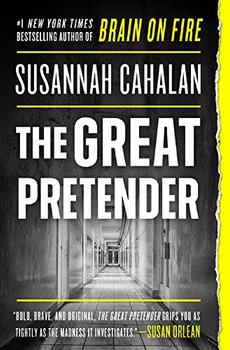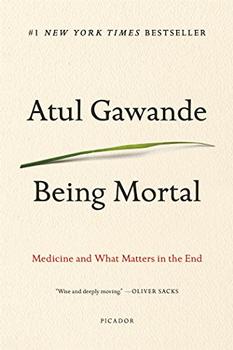Summary | Excerpt | Reviews | Beyond the book | Read-Alikes | Genres & Themes | Author Bio

Turn on the TV and zap through the
channels and the chances are you'll come across an
infallible doctor - either a talking head such as
"Dr Phil" or one of the good looking fictional
doctors of House, ER, Grey's Anatomy
et al who, in a mere 60 minutes including commercial
breaks and side-plots, manage to diagnose and cure
the most obscure of illnesses. Reality is a little
different - doctors are supposed to be emotionally
neutral and even-handed with every patient; they're
supposed to
explore every avenue before reaching their
considered opinion - but at the end of the day, they're just fallible humans like the rest of us,
working in an extraordinarily stressful field - and,
as a result, get about 15% of their diagnoses wrong.
How Doctors Think by Jerome Groopman and
Better by Atul Gawande (published in
paperback last month)
recognize the imperfections in the current medical
system but differ in their approach. Groopman
focuses on the thinking process that doctors go
through in order to reach a diagnosis; whereas
Better takes a more philosophical slant.
In a similar vein to Malcolm Gladwell's
Blink, Groopman suggests that if doctors can
become more aware of the thinking process that they
go through to reach a diagnosis, and in particular
to the role that their first impression plays in
that process, they can become better
diagnosticians.
Groopman's message to the patient is to recognize
that doctors are simply well-educated but fallible
humans and that "misguided care results from a
cascade of cognitive errors", and thus it is up to
the patient to present his or her symptoms in such a
way that the correct diagnosis can be made. Groopman
suggests that patients and their families should be
ready with questions that will probe the doctor's
thought process, such as "What else could it be?"
"Is there anything that doesn't fit?" "Is it
possible I have more than one problem?"
Fine words indeed but, considering the time and
financial constraints virtually all doctors work
under, is the advice practical? And is the system as
it stands so bad? If 15% of
diagnoses are wrong, 85% are right. If a tennis
player was to ace 17 out of 20 of his serves, or a
baseball player scored home runs 85% of the time,
they'd be considered exceptional!
There is an old medical aphorism that
states "When you hear hoofbeats, think horses, not
zebras". In other words, when all things are equal,
the simplest solution tends to be the best ones. On
that basis a few reviewers who are also doctors
caveat their otherwise positive reviews by saying
that the cases that Groopman highlights are all
zebras - cases that, if time and money were not
issues might have been correctly diagnosed, but in
the real world where time and money are
issues it's not surprising that they were
misdiagnosed.
There is some truth in this but not all of the cases Groopman highlights
can be easily written off as "zebras". For example,
the woman diagnosed with anorexia and bulimia who,
for fifteen miserable years, was put on a high carb
diet and treated for mental instability, before being correctly diagnosed with celiac
disease*. Not only did multiple doctors fail to
diagnose her correctly but she does not appear to
have made much effort to question the diagnosis that
she was mentally unstable herself! Perhaps if her
original doctor, or one of the many she saw
afterwards, had taken a little more time to talk to
her as a person, and perhaps if she had had more
confidence in her right and ability to question the
diagnosis, she wouldn't have suffered for fifteen
years.
The bottom line appears to be that, in the vast
majority of cases, doctors are very wonderful and dedicated
human beings, but there's always room for improvement;
which means that if both doctors and patients can become a
little more aware of the diagnostic thought process
it might be possible to push the batting average up
a few percentage points which, if you're one of the
15% misdiagnosed, could be the difference between
pain and cure, or even life or death.
As always, you can form your own opinion of How
Doctors Think by reading an extensive excerpt at
BookBrowse, in this case the full 23 page
Introduction. In addition, there are about 10 essays
by Groopman available on the web (see sidebar), some
of which are reprinted in How Doctors Think.
In addition, 20 BookBrowse members received copies
of How Doctors Think - you can read their opinions
here.
*Celiac disease, which effects an estimated 1 in 133 Americans, is an autoimmune disease which prevents the body from absorbing nutrients. It is triggered by gluten, found in most grains; thus a high carb diet is absolutely the worst thing for a person with celiac disease.
![]() This review was originally published in The BookBrowse Review in April 2007, and has been updated for the
April 2008 edition.
Click here to go to this issue.
This review was originally published in The BookBrowse Review in April 2007, and has been updated for the
April 2008 edition.
Click here to go to this issue.

If you liked How Doctors Think, try these:

by Susannah Cahalan
Published 2020
From "one of America's most courageous young journalists" (NPR) and the author of the blockbuster #1 New York Times bestselling memoir Brain on Fire comes a propulsive narrative history investigating the 50-year-old mystery behind a dramatic experiment that changed the course of modern medicine.

by Atul Gawande
Published 2017
In Being Mortal, bestselling author Atul Gawande tackles the hardest challenge of his profession: how medicine can not only improve life but also the process of its ending
Your guide toexceptional books
BookBrowse seeks out and recommends the best in contemporary fiction and nonfiction—books that not only engage and entertain but also deepen our understanding of ourselves and the world around us.